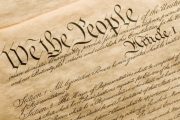President Obama has pledged he will not sign any law to expand the president’s war-making authority under the joint resolution known as the Authorization for the Use of Military Force, passed by both houses of Congress three days after the September 11, 2001 attacks on New York and Washington. What’s more, the president said in the major foreign policy address he delivered at National Defense University nearly two weeks ago that he looked forward to “engaging Congress and the American people in efforts to refine, and ultimately repeal, the AUMF’s mandate.” Yet in rejecting the concept of a “boundless ‘global war on terror,'” Obama promised a continued “series of persistent, targeted efforts to dismantle specific networks of violent extremists that threaten America.” These efforts will continue in Afghanistan and Pakistan, and in places such as Yemen, Somali, and North Africa, he said.
The question he did not acknowledge, not to mention answer, is where does the president find the legal basis for wielding that military force in all those far-off places if the congressional authority for using it has been repealed?
The AUMF says:
The President is authorized to use all necessary and appropriate force against those nations, organizations, or persons he determines planned, authorized, committed, or aided the terrorist attacks that occurred on September 11, 2001, or harbored such organizations or persons, in order to prevent any future acts of international terrorism against the United States by such nations, organizations or persons.
Under the Bush and Obama administrations, it has been claimed as authority for everything from the invasion of Afghanistan to extensive bombing in Pakistan, Yemen, and Somalia, and covert operations in who knows where. The Bush administration claimed its authority to defend the United States covered warrantless monitoring of Americans’ international phone calls, and Obama has claimed the power to target individuals overseas, including American citizens, for killing by drone attack. Both administrations have claimed the power to imprison terror suspects, including U.S. citizens, indefinitely and without trial, and Congress has codified that power in sections of the National Defense Authorization Act. The enemy has been redefined to include not only al-Qaeda and those who harbored or assisted the 9/11 attackers, but “associated forces,” some of which, such as the Pakistani Taliban and al-Shabaab in Somalia, were not yet in existence in on September 11, 2001.
In recent congressional hearings, Sen. Angus King (I-Maine) pointed out that “associated forces” appears nowhere in the AUMF, while Sen. Carl Levin (D-Mich.), chairman of the Armed Services Committee, has argued the authorization applies to organizations that have since allied with al-Qaeda and have “joined the fight against us.” Sen. John McCain, seldom bashful about the use of military force, has called the inclusion of associated forces “certainly a liberal interpretation of AUMF.” McCain, the ranking Republican on the Armed Services Committee, said he was considering offering amendments to the defense spending bill for Fiscal Year 2014 to make changes in the counterterrorism law. “It’s something whose time has come,” he said.
But change in what direction? Sen. Lindsey Graham (R-S.C.), who is usually allied with McCain on defense and foreign policy issues, made clear the direction he thinks he thinks the Congress should move. “I just think we need to broaden the definition,” said Graham, “and look at who is the enemy and where is the war in 2013.”
Broadening the definition of the enemy would necessarily mean broadening the war, which is what the president has been doing anyway, despite his statements about wanting a narrower focus and an end to the “global war on terror.” A recent Washington Post editorial warned of “a danger that dropping the AUMF — as opposed to tailoring it to the new conditions Obama described — will result in less restraint on presidential power, not more.” That, the Post explained, is because “top legal advisers at the State and Defense departments” have publicly said that absent the AUMF, “military attacks on terrorists can still be carried out under Article II of the Constitution, which grants the president power to defend the country against imminent attack. Most legal experts agree with that view,” the Post informed its readers.
And how “imminent” need an anticipated attack be for the president to use military force without seeking or obtaining authority from Congress? In February of this year, the administration’s top legal authority sent to congressional leaders a secret “White Paper” about the use of drones in counterterrorism operations. In that memo, obtained by NBC News, Attorney General Eric Holder wrote:
The condition that an operational leader present an “imminent” threat of violent attack against the United States does not require the United States to have clear evidence that a specific attack on U.S. persons and interests will take place in the immediate future.
So unclear evidence about a non-specific assault that may or may not happen “in the immediate future” might fit the definition of an “imminent attack.” And, of course, the threat could come from anywhere on the globe. Did the president say something about a “boundless global war on terror”?
Despite the deference paid unnamed “legal scholars” in the Post editorial, the Constitution offers no such power to the president in Article II or any other article. The records of the Constitutional Convention make clear that in the powers delegated to Congress, the words “declare war” were substituted for “make war” for the purpose of “leaving to the Executive the power to repel sudden attacks.” As Roger Sherman, a delegate from Connecticut, put it: “The Executive should be able to repel and not to commence war.”
In granting to Congress the power to “declare war,” wrote James Madison,
The constitution supposes, what the History of all Governments demonstrates, that the Executive is the branch of power most interested in war, and most prone to it. It has accordingly with studied care vested the question of war in the Legislature.
Hamilton, in comparing the war power of the president under the Constitution with that of the British monarch, wrote in The Federalist, No. 69 that the president would have “supreme command and direction of the military and naval forces, as first General and admiral of the Confederacy; while that [authority] of the British king extends to the declaring of war and to the raising and regulating of fleets and armies — all which, by the Constitution under consideration, would appertain to the legislature.” [Emphasis in original.]
Decades later, when President Polk, prior to any declaration of war, sent troops into disputed territory between Mexico and the new state of Texas, a congressman from Illinois named Abraham Lincoln wrote to his law partner William Herndon:
The provision of the Constitution giving the war-making power to Congress, was dictated, as I understand it, by the following reasons. Kings have always been involving and impoverishing their people in wars, pretending generally, if not always, that the good of the people was the object. This, our Convention understood to be the most oppressive of all Kingly oppressions; and they resolved to so frame the Constitution that no one man should hold the power of bringing this oppression upon us. [Emphasis in original.]
Thomas Jefferson, who authored the Declaration that defined America’s War for Independence, later wrote
An elective despotism was not the government we fought for, but one which should not only be founded on true free principles, but in which the powers of government should be so divided and balanced among general bodies of magistracy, as that no one could transcend their legal limits without being effectually checked and restrained by the others. [Emphasis in original.]
Far from acting to check and restrain executive overreach, the tendency of Congress for several decades has been to continually vote the president more power. The “question of war,” as Madison described it, has not been answered by Congress since World War II. The AUMF did not answer it, nor did a similar resolution for the 1991 Gulf War. Neither did the Vietnam (commonly called the Gulf of Tonkin) Resolution that the Johnson administration later claimed was “the functional equivalent” of a declaration of war. The equivalence is not there. The Constitution requires the Congress to decide whether and when we will go to war. The Congress chooses instead to “authorize” the president to decide. Then many of the same members who voted for the authorization turn against the war when it is going badly and becomes unpopular. Some will even complain of the “imperial presidency” they helped to create.
Consistency is not a requirement of elective office, nor a characteristic generally noted among members of Congress.
Photo of U.S.S. Wisconsin firing guns during Operation Desert Storm




